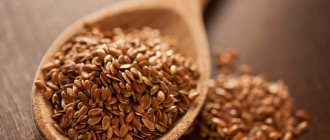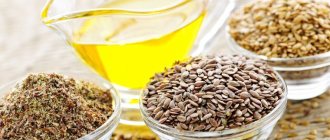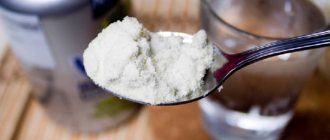Back to list Previous article Next article
21.06.2021
Tags:
useful, flax seeds
5/5 — (5 votes)
Flaxseed is a plant food that contains healthy fats, antioxidants, and fiber. Some call it a "functional food." This means that a person can use it to improve their health.
People grew flax as a crop in ancient Egypt and China. In Asia, it has been used in Ayurvedic medicine for thousands of years.
Today, flaxseed is available in the form of seeds, oil, powder, tablets, capsules and flour. People use it as a dietary supplement to prevent constipation, diabetes, high cholesterol, heart disease, cancer and several other diseases.
Nutrients in flaxseed include:
- lignans,
- antioxidants,
- fiber,
- protein and polyunsaturated fatty acids such as alpha-linolenic acid (ALA), or omega-3.
Consuming these nutrients can help reduce your risk of developing various diseases.
However, there is currently insufficient evidence to support all of these hypotheses. Let's look at what research says about flaxseed and its possible benefits.
Proper use of flax seeds in food
Flax seeds have a beneficial effect on the gastrointestinal tract if taken in the morning. On average, the course of taking seeds is 3 weeks. In the first 7 days it is recommended to consume 1 tbsp. l., and from day 8 increase the volume to 2 tablespoons. After the course there is a 2-month break.
Advice! Taking the seeds in the morning in combination with kefir has a beneficial effect on the body.
Before consuming the seeds, it is recommended to drink a glass of water with lemon juice on an empty stomach. After 10-15 minutes, have breakfast with boiled eggs, oatmeal or cottage cheese with berries. After a light breakfast, you can start seeding.
How to take flaxseed
To understand how to take flax seeds, you need to read the instructions below. More often the product is used in the form of such means:
- Flax jelly. To prepare it, just steam a small amount of grains in an airtight glass container. The seeds are kept in this state for 3 to 12 hours. Take flax seed in this form on an empty stomach in the morning;
- Flax seeds are added to food unchanged. The grains are used to season salads, baked goods, kefir and yogurt, and first courses. The nutritional value of the product thereby increases, and the body receives an increased dose of beneficial microelements. Seeds are also added to healthy cocktails and smoothies, and to coffee;
- Fiber (looks like finely ground dark powder). Sometimes it is used as flour for making sweet/unleavened baked goods. Flax fiber is also added to first and second courses, and to fermented milk drinks. It turns out to be a good cleanse with flax seeds for the purpose of losing weight and getting rid of toxins;
- Linseed oil. This product is especially valuable. The oil can be used as a light dressing for any salads. The product is also used for cosmetic purposes;
Important: using flax seed oil for cooking hot dishes is prohibited. Firstly, when heated, it loses all its valuable properties. Secondly, exposure to high temperatures makes the oil even dangerous for the body due to the oxidative processes occurring in it.
- If the reader is interested in how to use flax seeds for weight loss, then you need to eat a tablespoon in the morning on an empty stomach. Breakfast is not provided. In about a couple of months of such a diet, you can get rid of a couple of kilograms, provided you give up alcohol and sweet carbohydrate foods;
- Sprouted flax seeds. In this form, the product is even more beneficial for the body. To germinate a seed, you need to rinse it thoroughly and place it in a flat-bottomed container. Fill with clean water until the grains are completely covered. As soon as the seed absorbs moisture, you need to rinse it again and fill it with water again. So until complete germination. The finished product is also added to cereals, salads, etc.
Is it possible to take whole flax grains in a dry state?
Taking seeds in dry form without grinding them is of no benefit. They pass through the gastrointestinal tract without affecting the body. The easiest way to take them is to chew them thoroughly or grind them in a blender. When consumed in this way, the grains swell and become accessible to the gastrointestinal tract.
When ground, they retain all their nutritional value, so they can be safely added to salads, cereals, baked goods, soups and other dishes. It is worth remembering that it is recommended to take no more than 2 tbsp per day. l.
Diet Tips
Flaxseed can be consumed ground, in oil form, or in capsules.
It is also found in ready-to-eat foods such as muffins and other baked goods, pasta, snack bars and alternative milks.
Ground flaxseed can be added to:
- breakfast cereals,
- smoothie,
- soups and stews,
- salads and sandwiches,
- yoghurts.
You can also add a spoonful of flaxseed to the muffin mixture or use it to coat chicken instead of breadcrumbs.
However, too much flaxseed can give the food a bitter taste, which some people may not like. One solution is to start with a small amount and gradually add to taste.
How to properly consume flax seeds for weight loss
It is a mistake to believe that flax and its grains promote fat burning. However, if used correctly, you can achieve a monthly weight loss of 2-3 kg. This happens for several reasons:
- Decreased appetite. When the crushed seeds enter the stomach, they swell and fill the stomach space, which causes a feeling of fullness.
- Weakening effect. Seeds penetrating the intestines cleanse feces from its walls.
- The presence of vitamins F and E allows you to reduce the amount of bad cholesterol, removing it from the body.
- If you know how to drink flax correctly, it does not harm the body, but, on the contrary, enriches it with many useful microelements.
- Acceleration of metabolic processes, which also leads to weight loss.
- Normalization of blood sugar. Producing enough insulin leads to weight loss.
Advice! You can speed up the process of losing weight by combining the intake of seeds with physical activity.
For the purpose of losing weight, taking flaxseeds can be carried out according to one of the following schemes:
- 1 tbsp. l. crushed seeds are added to a serving of food. This will remove accumulated feces from the intestines and reduce body weight by 1 kg in a few days.
- Reception of ground grains 2 tbsp. l. after breakfast for 7 days. After a week of eating this way, you should take a break of 10 days. You can repeat courses no more than 5 times.
Effect on the human body
The seeds are superior to other plants in their nutritional and medicinal value. They contain many useful substances.
Flax seeds can help treat many diseases.
Flax proteins (albumin, globulin) are considered the most nutritious. The nutritional value of the protein is rated at 92 on a 100-point scale.
The seeds contain fats (41%), which are 3-substituted glycerol derivatives. The seeds contain higher quantities than fish oil, polyunsaturated acids omega-3, omega-6, omega-9, which are necessary for the body. They, like hormones, are responsible for important biological functions. Participate in the restoration of the cardiovascular and nervous systems, regeneration, growth and development of the brain.
Omega-3 has vasodilating properties, has anti-stress and antiarrhythmic effects.
Fiber and gluten stimulate intestinal function, remove fat deposits, and prevent atherosclerosis.
Lignan (estrogen-like phytohormone) is found in the seed coat. It has anti-inflammatory, antibacterial, antiviral effects, as well as fungicidal, wound healing, and anthelmintic. Positively affects the immune, lymphatic, hematopoietic system of the body. It regulates growth, reproductive function, and protects against ultraviolet radiation.
Lignans inhibit certain types of enzymes, thereby interfering with the growth of tumor cells.
Female
The product is indispensable for the female body, because... has a positive effect on the hormonal system and reproduction. Seeds, like oil, are involved in the process of breaking down adipose tissue, reducing the risk of developing breast and uterine tumors. They contribute to a smoother and calmer course of the menopause period.
Male
Flax is necessary for the male body, because... contains vitamins, minerals. It slows down aging, increases muscle growth during active physical activity and sports training. Increases immunity and potency. Prevents the development of tumors of the prostate gland and rectum. Positively affects the reproductive function of men, increases sperm activity.
Children's
The high calcium content in the seeds helps strengthen bones, their growth, and the formation of muscle and connective tissue. The seeds stimulate brain growth and improve impulse conduction. Positively influence the psychophysical development of the child. Potassium and magnesium nourish the heart muscle, thereby preventing the development of defects.
For gastritis
Flaxseeds are often used in the treatment of gastritis. Their beneficial effects are as follows:
- Protecting the mucous membranes of the stomach from the effects of rough food.
- Stimulates the passage of food through the gastrointestinal tract without damaging it.
- Analgesic effect.
- Reduction of inflammatory processes.
Important! In the case of gastritis, taking seeds may have contraindications due to concomitant diseases.
Raw grains are usually consumed in their pure form. For this, 1-2 tbsp. l. Chew thoroughly before eating and wash down with 200 ml of water. If you don’t want to eat raw seeds, you can make healthy drinks from them. To do this, take 5 g of seeds per glass of clean water. The liquid is placed on the fire, brought to a boil and simmered over low heat for about 20-25 minutes. After which it is removed from the stove and left for 2.5 hours. The finished drink is consumed before meals.
No less common is a decoction of 1 liter of water and 70 g of flax. The mixed components are boiled for about 2 hours, after which they are cooled and filtered. Take 200 ml one hour before each meal. The decoction is stored only for a day, after which a new one is supposed to be prepared. The course lasts 1.5 months.
Chemical composition
Flaxseed is a source of nutrients and biologically active substances that have a beneficial effect on the human body. It contains a fatty drying oil, which contains:
- triglycerides of linoleic, linolenic, oleic, palmitic and stearic acid;
- protein;
- carbohydrates;
- enzymes.
One of the important components in flax seeds is a natural bioantioxidant - tocopherol (vitamin E). The seeds are also enriched with potassium, which they contain approximately 7 times more than bananas.
Linumin (flax protein) has an almost complete complex of essential amino acids for humans. We also note that flaxseed proteins are more hydrophilic in structure than soy proteins.
Important!
100 g of flax seeds cover more than 20% of a person’s daily need for energy and 30% for protein.
In terms of carbohydrate composition, the seeds are a rich source of dietary fiber contained in their shells. Microfibers consist of polysaccharides and starch. Fiber helps the functioning of the intestines and reduces the manifestations of atherosclerosis. Seed carbohydrates contain water-soluble polysaccharides - pentosans, which, when soaked, can form mucus on the surface of the seed. Mucus protects the seeds from dehydration and serves as a water reservoir. They consist of galacturonic acid and sugars that are incapable of oxidation.
Flax seeds are a microsource of plant lignins, which belong to phytoestrogens, substances of plant origin. They cause estrogen-like activity in the human body.
For worms
The lignans contained in this product are known for their antihelminthic effect. And the effect of a laxative allows you to remove dead eggs and ectoparasites from the body.
Interesting! Flax is capable of affecting all types of worms, except roundworms.
To prepare the product you will need 1 tbsp. l. crushed seeds, which are then poured with 250 ml of boiling water. The container with the infusion is covered with a lid and left for 10-11 hours. It is best to postpone the preparation process to the evening. Use the product unstrained, half a glass 30 minutes before meals.
A combination of flax and cloves will help get rid of roundworms. The duration of such treatment will be 30 days. The medicine is prepared from 10 s. l. seeds and 1 tbsp. l. carnations.
All components are crushed in a blender. Can be used either dry or in combination with water. Take 1 tbsp at a time. l. before meals 3 times a day. This scheme is carried out for 3 days, after which there is a break for the same amount of time.
The following recipe has proven itself well in the fight against ectoparasites: 1 liter of boiling water is poured with 2 tbsp. l. flax seed powder, place on low heat and cook for no more than 20 minutes. The resulting broth is filtered and cooled. 1 tbsp is added to it. l. fresh aloe juice and mix thoroughly. The resulting composition is taken 100 ml 3 times a day before meals.
Herbal dietary supplement for women and men
If we consider the properties of flax seeds and contraindications, it is worth mentioning that the plant component has a beneficial effect on the reproductive function of both men and women. In men, the seeds restore potency. In women, they regulate hormonal levels and normalize the menstrual cycle.
Women also love seeds processed into oil. Flaxseed oil from flax seeds is an active component of many cosmetic masks for the skin of the face/hands/body, as well as for hair. The product nourishes cells, regenerating them and returning them to a healthy appearance. Homemade creams, shampoos, lotions, etc. are made from the oil. There are a huge number of cosmetic recipes made from flax seeds.
Flax seeds for constipation
This product is widely used in folk medicine as a remedy for constipation. The large amount of fiber it contains helps restore the mucous membrane of the stomach and intestines. In addition, it has a mild laxative effect, which allows not only to normalize stools, but also to remove toxins.
For constipation, you will need to take 1.5 tbsp. l. seeds and pour 150 ml of juice, milk or warm water over them. It is recommended to use the composition up to 3 times a day in compliance with a plentiful drinking regime. The result will be noticeable within 12 hours.
Rules of use
It is necessary to follow the rules for consuming seeds. The effect appears after a few days when taken in a reasonable amount.
Allowed quantity per day
It is recommended to take about 35 pieces. in a day. If there is a desire to eat more, it means that the body needs the substances contained in flax. In this case, it is allowed to increase the norm by 2 times.
At night and on an empty stomach
You can consume the seeds in any form at night and on an empty stomach in the morning. The exception is oil, because... may cause diarrhea.
Should I wash before eating?
It is advisable to rinse the seeds before use. It is possible to dry it slightly in the oven.
How to use flax seeds for cardiovascular diseases
In folk medicine, there are often recipes using seeds for the treatment and prevention of heart and vascular diseases. This is due to their rich composition, which includes Omega-3 fatty acids. As a result of their effect on the body, there is a decrease in bad cholesterol, as well as triglyceride levels.
Regular intake of seeds leads to normalization of high blood pressure, reducing the risk of blood clots, heart attack, stroke and other diseases of the heart and circulatory system.
For this purpose, a decoction prepared from 10 g of raw materials, poured with 250 ml of cold water, is well suited. It should be infused for about 3 hours and then taken orally on an empty stomach and before bedtime.
Contraindications
Contraindications to the use of flaxseed:
- intestinal obstruction;
- pancreatitis, cholecystitis;
- cirrhosis of the liver;
- the presence of stones in the bile ducts and bladder;
- product intolerance.
In what cases is it necessary to consult a doctor:
- for diabetes mellitus;
- for diseases of the prostate gland (in men).
If the dosage is incorrect, diarrhea may occur, blood sugar levels will increase, and an allergic reaction may occur.
Is it possible to eat flax seeds during pregnancy and lactation?
How to drink flax during pregnancy is a popular question of concern to expectant mothers. It's all about its properties:
- Combating constipation, which is common during pregnancy.
- Maintaining the elasticity of the walls of blood vessels. During pregnancy, this issue is especially relevant, since a woman’s heart contracts many times more often.
- Thinning the blood, which reduces the risk of plaque formation.
- Normalization of blood pressure, which may increase during pregnancy.
Important! Before a pregnant woman starts taking flax seeds, it is recommended that she consult her doctor.
There may be a number of contraindications for pregnant women to refuse to take seeds:
- uterine fibroid;
- stomach ulcer;
- threat of miscarriage or premature birth;
- hormonal disorders.
Linen and breastfeeding
As for the lactation period, the use of seeds can be carried out to improve lactation, prevent breast cancer, normalize hormone levels and reduce the likelihood of developing rickets in a newborn.
Before you start taking this product, you should be prepared for possible intolerance or an allergic reaction in your newborn. To minimize the risk of such manifestations, you should consult your pediatrician.
Harm of flaxseed: who is contraindicated
Like any product, flax seeds have a number of contraindications. Uncontrolled use of the product can cause pain in the liver area. It is recommended to consume the ground seeds immediately. When stored for a long time, they become rancid, lose their taste and beneficial properties.
It is forbidden to eat flax seeds for people who:
- kidney or bladder stones;
- acute inflammation of the stomach;
- myoma;
- hypercalcemia;
- individual intolerance;
- mastopathy.
Pregnant women and children also need to be careful. Flax seeds affect the intestines, enhancing its motility. It is important to take these factors into account immediately so as not to worsen your health condition.
Flax seeds are highly valuable, but this does not mean that they are always healthy. Only their correct use helps to improve well-being and improve health.
Is it possible to give flax seeds to a child?
Flax seeds can be introduced into children's diet in several cases:
- Diabetes. Children can also suffer from this disease. Doctors recommend introducing bread made with flaxseed flour into your diet.
- Weak immunity. Moderate intake of seeds is especially necessary to maintain the immunity of children who attend kindergarten or primary school.
- Depression. Lethargy, worry and apathy are characteristic not only of adults, but also of children. Flax, on the other hand, is able to saturate the child’s body with energy for new discoveries and endeavors.
- Irregular bowel movements. The fiber contained in the seeds normalizes the process of bowel movements. For the best effect, it is recommended to drink enough water.
Reception features
Flax seeds are not only beneficial, but can also be harmful to health. It is necessary to follow the dosage indicated in the prescription so as not to harm yourself or your child.
For women
Women are recommended to consume flax in its natural form. It contains phytoestrogens, which are an analogue of female hormones. The seed helps cleanse the body of toxins.
It is forbidden to use by women with hypersensitivity, as an allergic reaction may occur. Should not be used for endometritis, polycystic disease and uterine fibroids. Consultation with your attending physician is necessary. Pregnant women can consume flax seeds, but only after permission from a specialist.
For men
To support immunity, men are recommended to make an infusion of flax. Add 1 tablespoon of flax to a glass of water and leave for 6–7 hours. The drink must be drunk within 24 hours. For people over 50 years of age, it is recommended to consume one tablespoon of flax daily. It helps protect a man from prostate cancer and increases the level of testosterone production in the blood.
Features of reception during breastfeeding
Some doctors say that adding flax can be harmful, others say it can help a young mother. Flaxseeds are contraindicated for a child at an early age. They can be added after 6 months. Before use, you should consult your doctor.
How long do seeds last?
On sale you can find whole and already crushed seeds. In the first case, it is better to use bags made of natural fabric to store them, which allow air to pass through. If they are placed in a dark and cool place, the shelf life is 12 months.
Advice! Maximum shelf life can be achieved by placing the seeds in an airtight package and placing them in the refrigerator. In this case, the useful product can be used for 2 years.
Crushed seeds quickly oxidize in air, so after opening the package they can be eaten for no more than 1.5 months. If you put them in the refrigerator, the shelf life will increase to six months.
Benefit for health
Source of antioxidants and minerals
Flax seeds are rich in antioxidant polyphenols called lignans. They protect against oxidative damage (DNA damage caused by pollution and poor diet that lead to aging) and improve cardiovascular, colon and prostate health, and fight cancer.
In addition, flax seeds contain significant amounts of potassium, calcium, magnesium and phosphorus, all of which help to compensate for mineral deficiencies in the diet.
Cancer Prevention
Current research shows that flaxseed may have a protective effect against breast, prostate and colon cancer. According to Kelley C. Fitzpatrick (director of the Flax Council of Canada), at least two components of flaxseed contribute to this: lignans and omega-3 fatty acids.
Flax seeds are an effective aid against cancer, especially hormone-sensitive types such as breast cancer. This is due to the conversion of lignans entering the intestines into two substances: enterodiol and enterolactone. These substances have some estrogenic activity, meaning that they can bind to estrogen receptors and actually reduce overall estrogenic activity. All of this is important when it comes to hormonal cancers, since high levels of estrogen can stimulate their growth. Other experts argue that exposure to lignans during adolescence helps reduce the likelihood of developing breast cancer, thereby increasing the chances of a favorable outcome. Lignans may also help protect against cancer by blocking enzymes that are involved in hormone metabolism and also interfere with tumor growth and expansion.
A-linolenic acid, found in flaxseed, has been shown to suppress tumor incidence and growth in animal studies. Some of the other components of flaxseed also have antioxidant properties that may help prevent cancer and heart disease.
Cardiovascular diseases
Plant PUFAs support the cardiovascular system through various mechanisms, including anti-inflammatory effects and normalization of heart rhythm. New research shows a significant reduction in blood pressure as a result of taking flaxseed.
A diet rich in Omega-3 helps prevent hardening of blood vessel walls (arteriosclerosis) and plaque buildup in the arteries (atherosclerosis) by helping white blood cells attach to the lining of blood vessels. Plant Omega-3 fatty acids may be involved in maintaining the natural heart rhythm, so they may be useful in treating arrhythmias and heart failure. However, more research is needed in this regard.
Improve digestion and prevent constipation
Flax seeds are rich in soluble and insoluble dietary fiber, which can help prevent constipation. This effect is due to the high content of mucous resins (part of the soluble fibers). Interestingly, these resins become viscous or fluid at an optimal pH range of 6-8 (for example, in the intestinal tract). This sticky material is found in many laxatives, making flaxseed an excellent laxative.
Helps you lose weight
As mentioned, flaxseed is rich in soluble and insoluble fiber, which helps suppress hunger and slow down the emptying of food from the stomach. This makes a person feel full after eating, which is one of the reasons why nutritionists constantly recommend high-fiber foods for weight loss.
Reduces cholesterol levels
Flaxseed is one of the best candidates for combating high cholesterol. High levels of LDL, or “bad” cholesterol, in the blood are associated with an increased risk of heart disease, obesity, diabetes and metabolic syndrome.
And people who regularly take flaxseed have improved lipid profiles and plasma glucose thresholds. A study conducted on menopausal women showed a decrease in LDL after consuming 4 tbsp. l. flaxseed every month (for one year).
In addition to improving cholesterol levels, flaxseed improves the vascular relaxation response, all of which can reduce the risk of all types of cardiovascular diseases. These effects are believed to be a result of the combined benefits of omega-3, fiber, and lignans found in flaxseed.
Reduces the risk of diabetes
High blood sugar threshold leads to diabetes. And flax seeds help regulate blood glucose levels.
Adding 10 grams of flaxseed powder to the diet of patients with type II diabetes for one month reduces fasting sugar levels by 19.7%.
This effect is due to lignans and omega-III. They suppress the expression of the gene encoding an important glucose-synthesizing enzyme in the liver, thereby reducing the risk of developing diabetes.
Improves brain health
Flaxseed is rich in omega-III, namely α-linolenic acid (ALA), which plays an essential role in the health of the brain and nerve tissue. A deficiency of this substance can lead to changes in the structure and function of the meninges, as well as mild brain dysfunction.
Research suggests that ALA may play an important role in determining visual and brain abilities, including intellectual ability, in infants.
Supports the Immune System
The protein in flaxseed consists of high amounts of arginine and glutamine, which support the function of our immune system. Glutamine has the ability to reduce mortality and infection by strengthening the immune system as well as anti-inflammatory effects.
Reduces inflammation
Two components in flaxseed—a-linolenic acid (ALA) and lignans—can reduce inflammation, which is seen in certain diseases such as shaking palsy and asthma. According to scientists, this is achieved by blocking certain pro-inflammatory agents.
Reducing the inflammation associated with plaque buildup in the arteries may be another way flax seeds help reduce the likelihood of heart attack and stroke.
Improves women's health and menopausal symptoms
Flax seeds and products enriched with them are excellent for women's health. Consuming them regularly can help relieve menopausal symptoms, as well as cope with irregular periods and discomfort associated with menstruation.
A study on menopausal women published in 2007 found that taking 2 tbsp. l. Ground flaxseed mixed with cereal, juice or yogurt twice a day helped reduce hot flashes by half. The intensity of these tides also decreased by 57%. Women noticed these effects after taking flaxseed daily for just one week, and felt the maximum benefits within two weeks.
Helps skin and hair
In Ayurveda (one of the most ancient medical sciences), flaxseed is used to improve the strength and radiance of skin and hair. On the other hand, a deficiency of these fatty acids can lead to flaky skin, “toad-like” skin, and slow wound healing.
Contraindications to the use of flax seeds
Taking flax is not recommended for the following categories of people:
- Pregnant women. Conducted studies have not fully understood the effect of flax seed on the developing fetus. In any case, there will be no negative process from a single or short-term use. In other cases, it is recommended to consult a doctor.
- In the presence of exacerbations of pancreatitis, cholecystitis and other diseases. This is due to the choleretic effect of flax.
- Some people experience increased gas and bloating after taking the seeds. This is due to the sudden intake of large quantities of them. If a person has never used this product, it is better to start gradually: with half a teaspoon and increase to the desired volume.
The benefits of flax seeds on the human body have been proven by scientists and confirmed by many generations. Even with ideal health, it will be useful to take a course on cleansing the intestines and preventing the development of gastritis.
Admission rules
Doctors strongly recommend consuming raw flax. It can be eaten separately after eating food.
If the seeds are difficult to chew, you can grind them in a coffee grinder. After grinding, the grains must be consumed within 12 hours, after which time they oxidize and harm the body.
Doctors allow seeds to be treated with boiling water, but the temperature should not exceed 100 °C. At this temperature, fats do not become carcinogenic, but the seeds lose a number of useful vitamins and microelements.
Dose and proportion
An adult needs to eat several tablespoons of seeds per day. Doctors recommend starting with 2-3 teaspoons and gradually increasing the dose. Laxative properties can cause a number of inconveniences, so the body must get used to the new product.
Decoction for making mucus
You can prepare a decoction, infusion or mucus from flax seeds. For cooking, you can use whole grains or grind them. The correct method of preparation is to pour warm boiled water over the seeds. The mucus will begin to swell, resulting in an infusion. It can be applied to the skin, so inflammatory processes go away.
The infusion heals diseased areas of organs. For those with more gastritis, the mucus should be consumed 30-40 minutes before meals. It is not recommended to brew the infusion; flax releases toxic substances and harms the body.
Flax seed decoction
One of the popular and common ways to prepare flax grains is to brew the seed. To do this you need:
- Take 2 tablespoons of seeds, put in a saucepan and pour in 1 glass of water.
- Place over low heat and cook for 25–30 minutes, stirring slowly.
- Drink the prepared decoction 100–150 ml in the morning on an empty stomach. The course is 10 days.
Doctors strongly do not recommend taking the decoction, since the grains lose their beneficial qualities after heat treatment.











